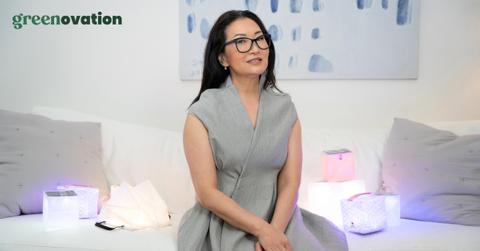When inventors first imagined the lamp, surely no one wished for humanity to rely on kerosene — a combustible and toxic fossil fuel discovered in the 1840s by Canadian physician and “father of the modern petroleum industry" Abraham Gesner — to illuminate their lives.
According to a 2019 study, kerosene poisoning is considered "one of the most common accidental poisoning in children in developing countries."
Solight Design noted that "when the sun goes down, 1.6 billion people live without access to electricity and rely on kerosene to light their night." For the company's founder and CEO, Alice Min Soo Chun, this was unacceptable.

Chun merged experiences as an architecture professor, a daughter of designer parents, and a concerned, research-savvy mother to create a charitable company that brings healthy light to at-risk lives around the globe. Solight Design's award-winning, origami-inspired, "self-inflating" lanterns use solar technology and light-as-air, eco-friendly, and malleable materials to harness the sun's energy.
Having earned a USPTO Patents for Humanity Award, a MoMA display, and the attention of the Clintons (appearing in 2019's The Book of Gutsy Women as well as Apple TV's 2022 docuseries Gutsy), Chun is a modern-day heroine inventor.
"I want to inspire girls and young women to get out there and follow their dreams and invent," Chun exclusively tells us. "There's only eight percent women on patents in the United States Patent and Trademark Office."
Green Matters spoke with Alice Chun about her influential upbringing, Solight Design's charitable initiatives, and the concept of a "solar lifestyle."
This interview has been edited and condensed for length and clarity.

GREEN MATTERS: What inspired you to start Solight Design?
ALICE CHUN: I was a professor in Architecture and Material Technology at Columbia University and at Parsons The New School for Design. I actually ran a materials lab, researching the most sustainable products and trying to get away from petrol-based plastics. My focus turned to solar energy after the birth of my son.
Issues like climate change, pollution, and fossil fuel usage offered an eye-opening experience. How can I help via new products that harness solar energy? I started sewing solar panels to fabric.
Solar lights on the market were all heavy, hard, plastic, bulky, and non-recyclable. Polycarbonate is one of the most toxic plastics in terms of embodied energy and toxins from the production of it. Solight Design uses recyclable, biodegradable, non-toxic materials for our products. No PVC, no vinyl.

GM: How did your upbringing influence the innovative design of your lanterns?
AC: My father was an architect and my mother was an interior designer as well as a painter/muralist. My upbringing was very open to creativity and imagination. We grew up pretty poor, so my parents made their own furniture.
I'm Korean, and my mother taught me origami. The SolarPuff is based on the origami balloon. You can flat-pack it, and then you pull the handles and it pops open into a beautiful cube. It's made with tri-axial weave sailcloth material, which is indestructible. I tried to make it as light as possible to reduce shipping costs.
GM: Solight Design's website states: “Every time you choose clean light it's a big individual step towards a more sustainable, solar lifestyle.” Can you elaborate?
AC: Some office buildings have lights on constantly. What if we could harness enough of the sun's energy to live our lives instead of harnessing energy for surplus? I think we can lower our carbon footprint that way.
GM: Tell us about Solight Design’s charitable initiatives!
AC: In 2015, we did a Kickstarter. Nepal had this huge earthquake that year, and we said to our Kickstarters, "You can buy to give a light to Nepal." We raised half a million dollars in 30 days and were able to send 1,700 lights. That started our company.
After Hurricane Maria hit Puerto Rico, there were about 2 million people without electricity. We were able to get over 100,000 lights to to help the victims. I was given a small award by the Clinton Foundation.
We also have a humanitarian mission for the Navajo Tribe children in Utah. In fact, of the 300,000 people on that reservation, 60 percent don't have running water or electricity.
Last year it was Ukraine, Turkey, the fires in Maui, the earthquake in Marrakesh. We're still sending lights to Ukraine, and we're trying to send to both Israel and Gaza. We're not affiliated with either, we care about the children.
We have a "Give a Light" page, but we also donate lights ourselves, as well as 10 percent of profits.
“Greenovation” is a series from Green Matters that invites founders of companies that are not only disrupting industries, but also trying to change the planet for the better.

